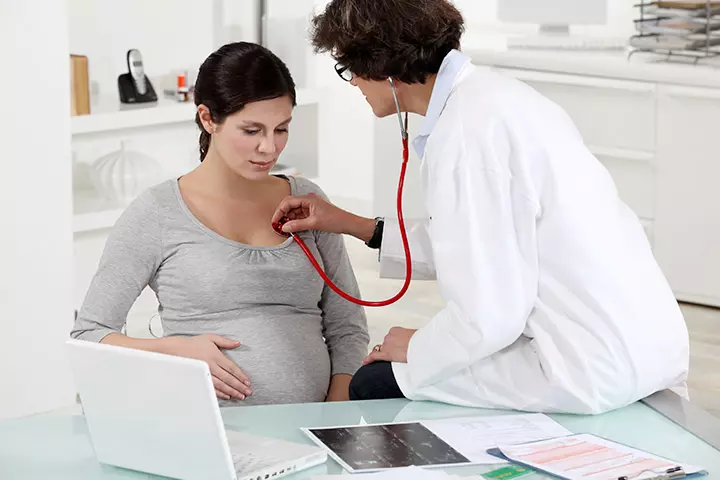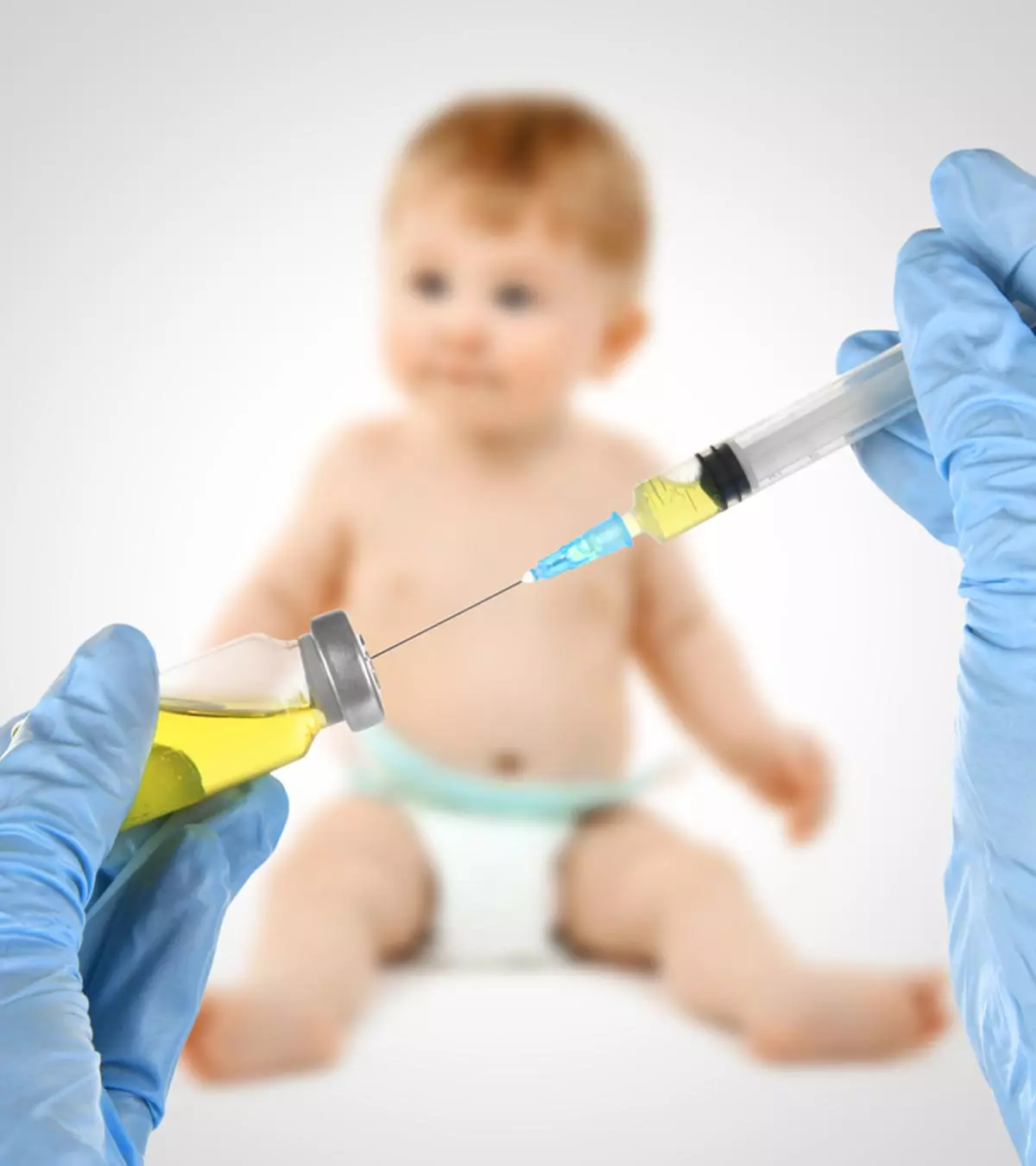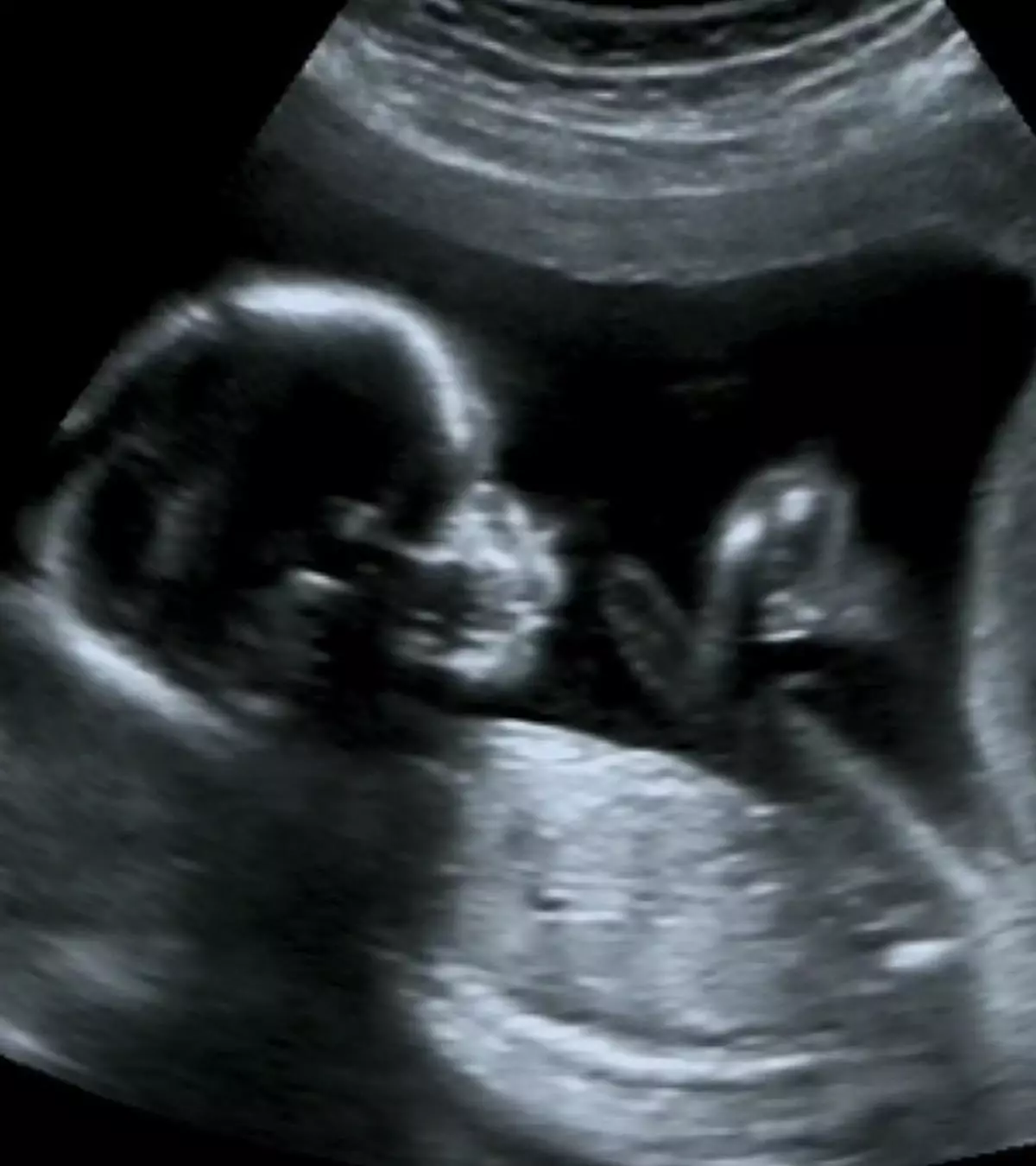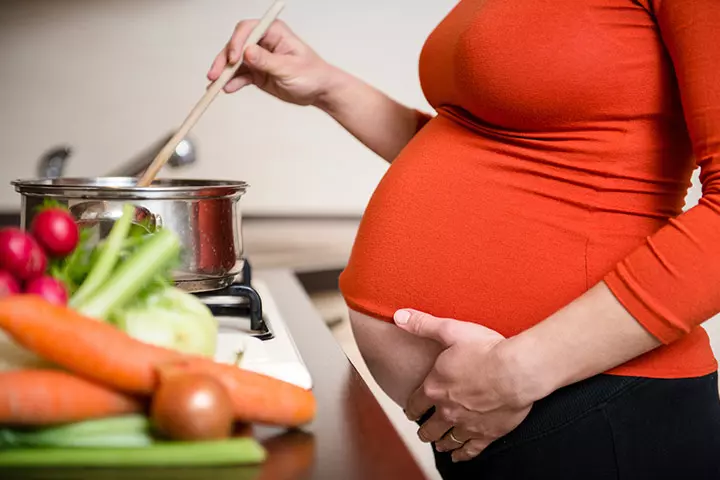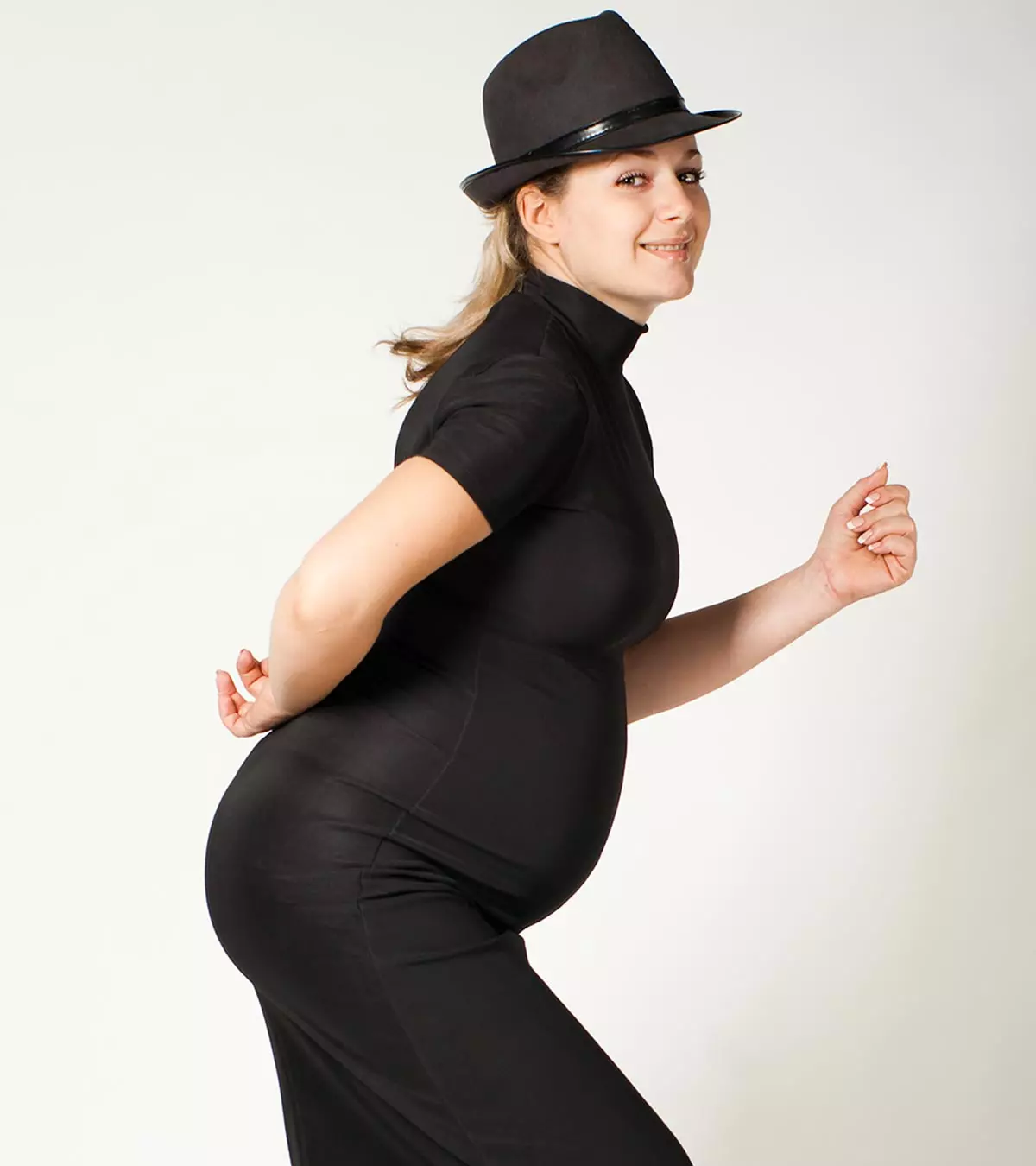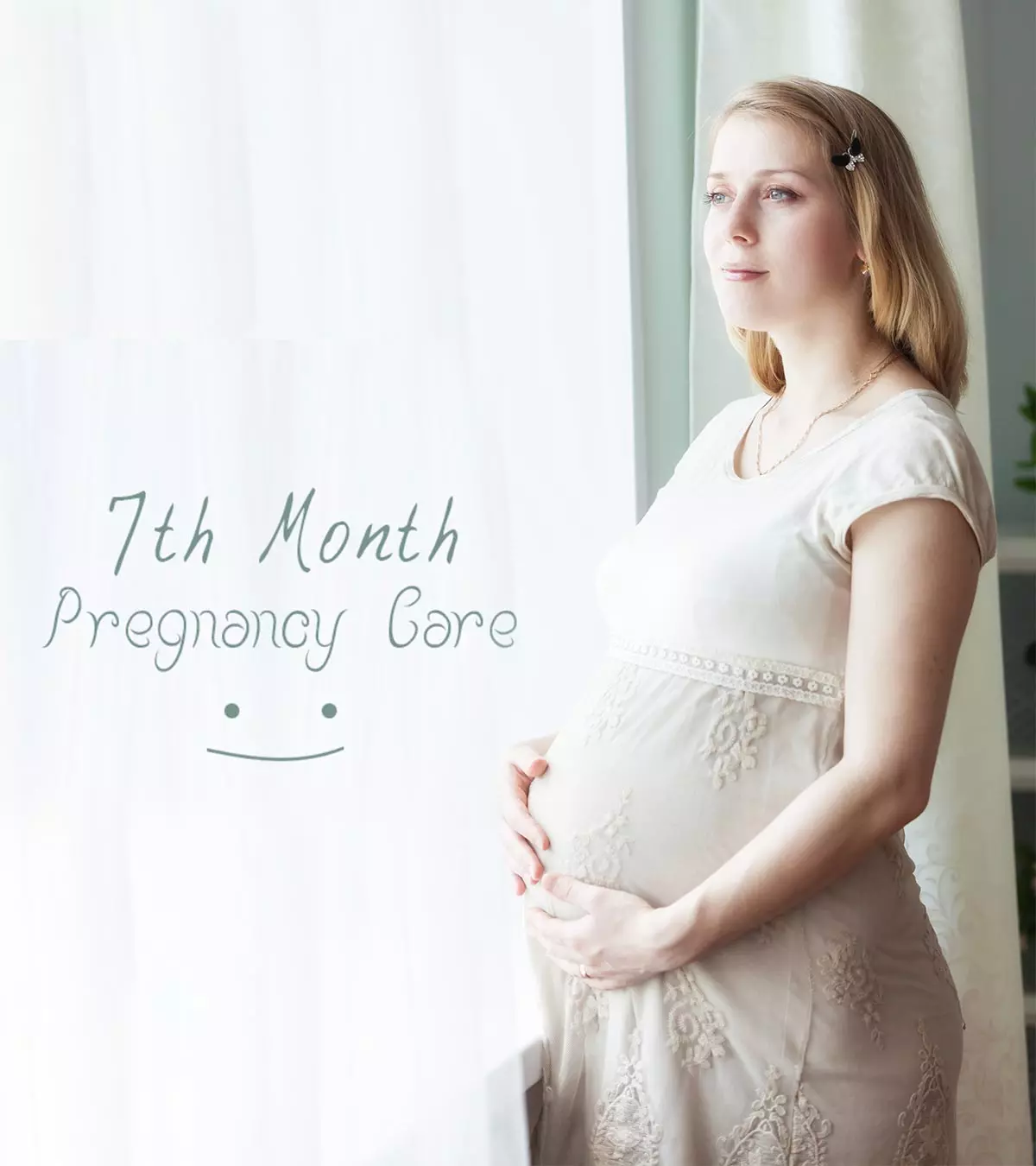
Image: Shutterstock
Now that you’re 7 months pregnant, you enter your third and last trimester. This is the time between 25 and 28 weeks of your gestation when your baby’s growth in the womb is fastest. Aside from the bodily changes, the increased discomfort caused by the growing pregnancy belly and feelings of excitement and anticipation at the impending delivery may make this a stressful month.

Understanding these changes is essential for both your well-being and your baby’s growth. At this stage, regular prenatal visits become even more important to monitor the health of both mother and baby. This post discusses the physical changes and baby development that occur during the seventh month of gestation and the precautions and advice to keep you safe and comfortable.
Key Pointers
- The seventh month of pregnancy (the beginning of the third trimester) is from the 25th to the 28th week.
- As your baby bump grows bigger, you may experience difficulty walking, bending, and sleeping.
- You may also experience lower back pain, abdominal cramps, frequent urination, and shortness of breath.
- Your breasts may become tender and you may experience swelling in your hands.
- Fatigue and varicose veins in the legs may also develop.
- The baby settles in the “head-down” position this month and also moves and kicks.
- Gentle exercises such as walking, stretching, and having a healthy diet can help keep you active.
What Symptoms Do You Experience In The Seventh Month Of Pregnancy?

Identifying the 7th-month pregnancy symptoms is crucial for a smooth sail. The pregnancy bump gets bigger, making you feel extra uncomfortable and resulting in the following symptoms this month (1) (2):
- You may have difficulty walking, as the protruding baby bump puts pressure on your bladder and legs.
- You could experience pain in your lower back due to the added pressure of the bump and increased weight.
- You might have mood swings and anxiety pangs.
- With the stretching uterine muscles and the bump squashing your tummy, there is a chance of having frequent contractions and abdominal cramps.
- The increasing metabolism makes the body warmer, and you might feel hot even in cold weather. You may start to sweat and experience shortness of breath at times.
- The center of gravity shifts downwards with the growing baby, and the pressure on the uterus results in frequent urination.
Some pregnant women may develop anemia, hemorrhoidsiSwelling of the veins in the lower rectum or anus. , upset tummy, frequent heartburniA burning sensation in the chest when food and stomach acid reflux back into the esophagus. , and spasmsiAn abrupt, involuntary contraction of a muscle or a set of muscles. in the tummy this month.
 Quick fact
Quick factBody Changes During The Seventh Month Of Pregnancy
Several body changes occur during the seventh month of pregnancy, as the body starts to prepare for delivery (3).
- Breast changes: Your breasts will become tender, heavier and denser with visible veins and darkened nipples and areolaiThe region of dark skin around the nipple on the breast. . They will also start producing milk, and could sometimes leak. You should wear a comfortable and well-fitting bra for the required support.
- Gait changes: Your gait changes and your feet will involuntarily part while you walk, to support the growing tummy. You will be walking like a ‘pregnant woman’ from now.
- Swelling: The increased blood supply might cause puffiness and swollen feet and hands.
- Fatigue: The heavy bump puts extra strain during certain activities, tiring you very easily.
- Varicose veins: The increasing blood supply enlarges the veins in the legs, thereby causing varicose veinsiA common problem caused by weakened or damaged vein valves and walls. .
 Did you know?
Did you know?Baby’s Development In The Seventh Month Of Pregnancy
Starting this month, your baby is becoming a unique little person. The baby’s personality and intelligence are getting more complex (4) (5) (6).
| Body Parts | Developmental Stage |
|---|---|
| Brain and nervous system | Grows faster and is now sensitive to sound, smell, and music |
| Lungs | Start functioning |
| Sleeping and waking patterns | Are more pronounced |
| Eyes | Eyelids slowly open, and eyes respond to light and darkness |
| Lanugo | Starts to disappear |
| Skin | Red and wrinkled, fat accumulation begins |
| Tongue | More taste buds develop where baby can distinguish different flavors |
| Gastrointestinal tract | Starts to function |
| Bones | Begin to harden |
| Skull | Remains softer |
How Does A Seventh Month Baby Look Like In The Womb?
By the seventh month, your baby weighs around two-and-a-half to three-and-a-half pounds and measures 14 to 16 inches in length (7).
Baby’s Movement In The Seventh Month
You will experience frequent kicking and stretching movements by this month. This time, you can also connect with your little one through touch and sound (5).
Baby’s Position In The Seventh Month
Changes in the baby’s position is another 7-month pregnancy symptom. The baby lies vertically with the head towards the cervical region, to prepare for birth. This is considered to be the safest position for a normal delivery (8).
Dos And Don’ts In The Seventh Month Of Pregnancy
As you enter the third trimester, you should be extra careful with your diet and lifestyle (9) (10).
Dos:
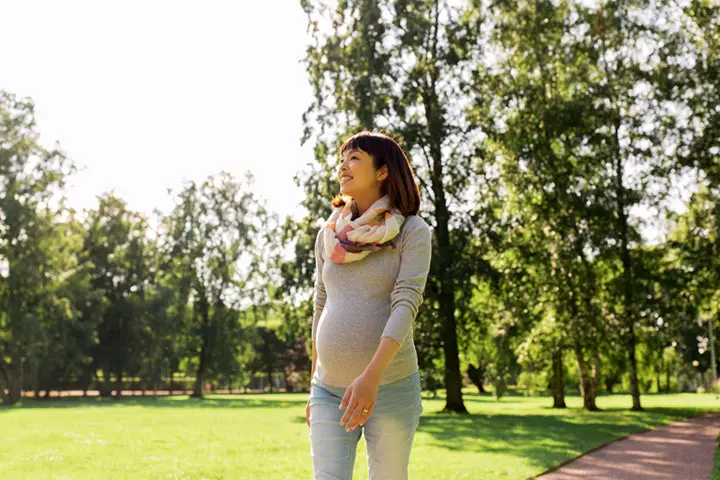
- Consider walking regularly, with small breaks in between. Also, avoid standing and sitting in the same position for prolonged hours. Keep your body active and flexible.
- Continue regular exercise with your doctor’s approval. Go for regular walks, yoga, swimming or any other workout of your choice. An active lifestyle helps in easy delivery and in recovering faster after childbirth. Basic stretching exercises help.
Florida-based physician Dr. Matthew Casavant says, “Exercise and physical activity remain crucial even in the seventh month of pregnancy. I recommend light to moderate activities such as walking, swimming, and prenatal yoga. These exercises aid in maintaining body flexibility, alleviating common discomforts like back pain, and improving sleep quality.”
- Get a hobby. Read a book, paint, sing, or try gardening. It will keep you calm, relaxed and take away any unnecessary thoughts and tensions.
- Rest as much as possible. Sleeping on the back might be difficult with the growing tummy, so try sleeping on your side. Placing cushions against your tummy and between your legs can make it more comfortable.
- Wear cotton clothes as they are comfortable and breathable since you are likely to perspire more due to an increase in the basal body temperature. Use simple deodorants made of natural ingredients.
- Consider hosting a baby shower to share the good news with your loved ones, if you haven’t already done so.
Go for regular blood tests, especially if you belong to the Rh-negativeiRhesus factor is a protein that is found in red blood cells; when a pregnant woman is Rh-negative, complications may occur. blood group, to check your hemoglobin levels and discuss birthing plans with your doctor and partner.
Don’ts:

- Quit smoking and alcohol completely. Also, avoid passive smoking as second-hand smoke is also dangerous for you and your baby.
- It would be difficult to bend now, owing to the growing bump. Do not try slouching, and always maintain the right posture.
- Do not lift heavy objects as it can put pressure on the tummy and affect fetal growth.
- Avoid loud music and exposure to excess noise. Your baby’s hearing is formed fully now, and anything loud could startle the baby.
Diet tips for the seventh month
- Include omega-3 fatty acids as they enhance the growth of the baby. This is also the period where the baby develops cognitive and visual abilities. Foods such as eggs, seafood and walnuts help.
- Take fruits and vegetables rich in iron and vitamin C. Also include natural iron sources such as spinach, eggs, meat, and green leafy vegetables.
- Have small, light and healthy meals at frequent intervals to facilitate proper maternal nutrition. Avoid heavy meals and greasy food.
- Increase fluid intake and reduce salt intake from canned foods, sauces, ketchup, chips, and pickles. This helps you get rid of water retention and swelling.
- Include fiber-rich foods such as fruits and vegetables, legumes, and whole grains in your 7-month pregnancy diet. They help prevent constipation.
- Avoid spicy, acidic, and fatty foods, even if you have a craving for them, as they elevate the symptoms of indigestion and heartburn.
What To Expect During Your Visit To The Ob/Gyn?
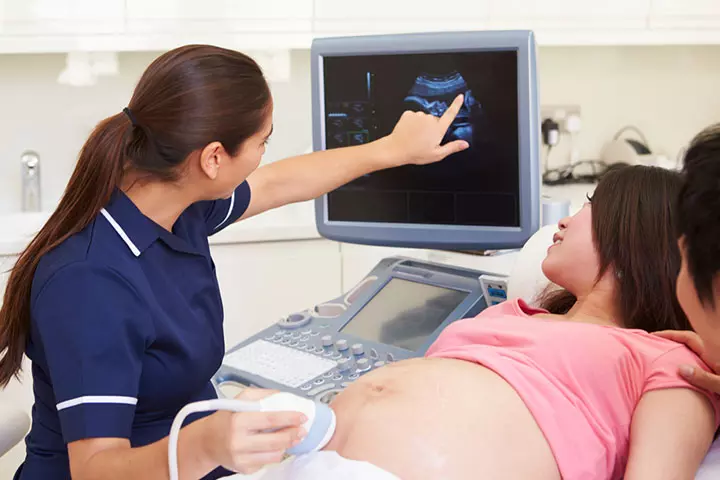
Starting this trimester, you should visit your doctor twice a month for receiving proper prenatal care. Follow the doctor’s advice and instructions without fail. You might have to get the following tests and checks done (3).
- Physical examination: Your weight and blood pressure are checked to monitor your weight gain and assess the risk of developing pre-eclampsia. Also, the breasts, abdomen, and vagina are examined.
- Ultrasound scan: This is conducted to analyze the changes in fetal development. It is also the time for your first growth scan.
- Heartbeat: Doppler ultrasound is used to check the fetal heart rate.
- Rhogam shot: If you belong to the Rh-negative blood group, and your partner is Rh-positive, you may have to take Rh immune globulin injection during the seventh month, provided the indirect Coombs test is negative. It helps build antibodies against the Rh factor (11).
- Glucose tolerance and blood test: You may go for a oral glucose tolerance test and complete blood count (CBC) at 28 weeks.
Be ready to discuss any concerns and ask questions about the delivery process, as this is an important time to plan your birth experience.
Ultrasound During The Seventh Month
The optimal time for the ultrasound scan is between 24 and 26 weeks where all the organs are visible. The ultrasound helps monitor the baby’s growth, checks amniotic fluid levels, determines the fetal position and assesses the placenta (12).
What Are The Common Concerns During The Seventh Month Of Pregnancy?
If you experience the following situations, or any other unusual symptoms causing discomfort or pain, consult your doctor.
- Extreme pressure or pain in the lower back
- Reddish brown colored vaginal discharge
- Bleeding gums
- Excessive mucus formation and saliva secretion
- Headache, fatigue, and dizziness
- Gastric problem and constipation
- Frequent forgetfulness
- Heartburn and hemorrhoids
Keep your partner updated on how you are doing and seek help to manage the pregnancy better,
Tips For The Dad-to-be
- Get your partner to set up the baby’s nursery. Although the safe place for the baby in her first six months is your room, you might not get a chance to prepare a nursery later. Setting up now means less worry later.
- Go with you to sessions and practice relaxation techniques that help to ease labor. Practicing these techniques every day before bedtime helps.
- Help you make a list of baby essentials. Buy them beforehand so that it will be easier during the time of delivery.
- Communicate with other dads or dads-to-be in person or online forums to deal with any fears and feelings. Getting a few helpful tips before the baby’s birth helps you stay prepared.
Frequently Asked Questions
1. Who kicks more, baby boy or girl?
According to study findings, male fetuses displayed a higher number of leg movements in a minute when compared to female fetuses (13).
2. Can a baby survive at seven months premature?
The chances of a baby dying or experiencing long-term health problems are reduced in the case of premature birth at 26 to 27 weeks of gestational age. The survival rate of babies born at 28 weeks is between 80 and 90 percent, and they have only a 10 percent chance of experiencing long-term health problems (14).
3. What week is it safe to deliver a baby?
Your pregnancy is considered full-term at 37 weeks. By then, a normal baby weighs between 3 and 4kg. Your child is prepared for birth. A preterm delivery is when a baby is born before 37 weeks of pregnancy (16) (17).
4. When should I pack my hospital bag?
You may prepare your hospital bag with a few items required during labor and delivery at least three weeks before the due date (18).
The third trimester marks its beginning when you are 7 months pregnant. The rapid fetal growth during this stage brings about a new set of challenges, including lower back pain, abdominal pain, and shortness of breath. However, the good news that your baby is now developed, and you may hear from them through their kicks, is exciting. Understand that these discomforts are only for a few more months, and prepare yourself for your baby’s birth. Maintain a healthy lifestyle and engage in activities that keep you and your baby safe and comfortable.
Infographic: Stretches 7 Months Pregnant Women Can Do To Relieve Backache
Studies indicate that lower backache usually occurs during pregnancy’s 5th and 7th months. This infographic provides information on some basic stretching exercises you can try to strengthen your upper body muscles and relieve backaches. Illustration: Momjunction Design Team
Watch how your baby grows and develops during the seventh month of age. See how they learn to crawl, explore their environment, and start to communicate, and what more can you expect?
Illustration: 7 Months Pregnant: Symptoms Body Changes & Baby Development
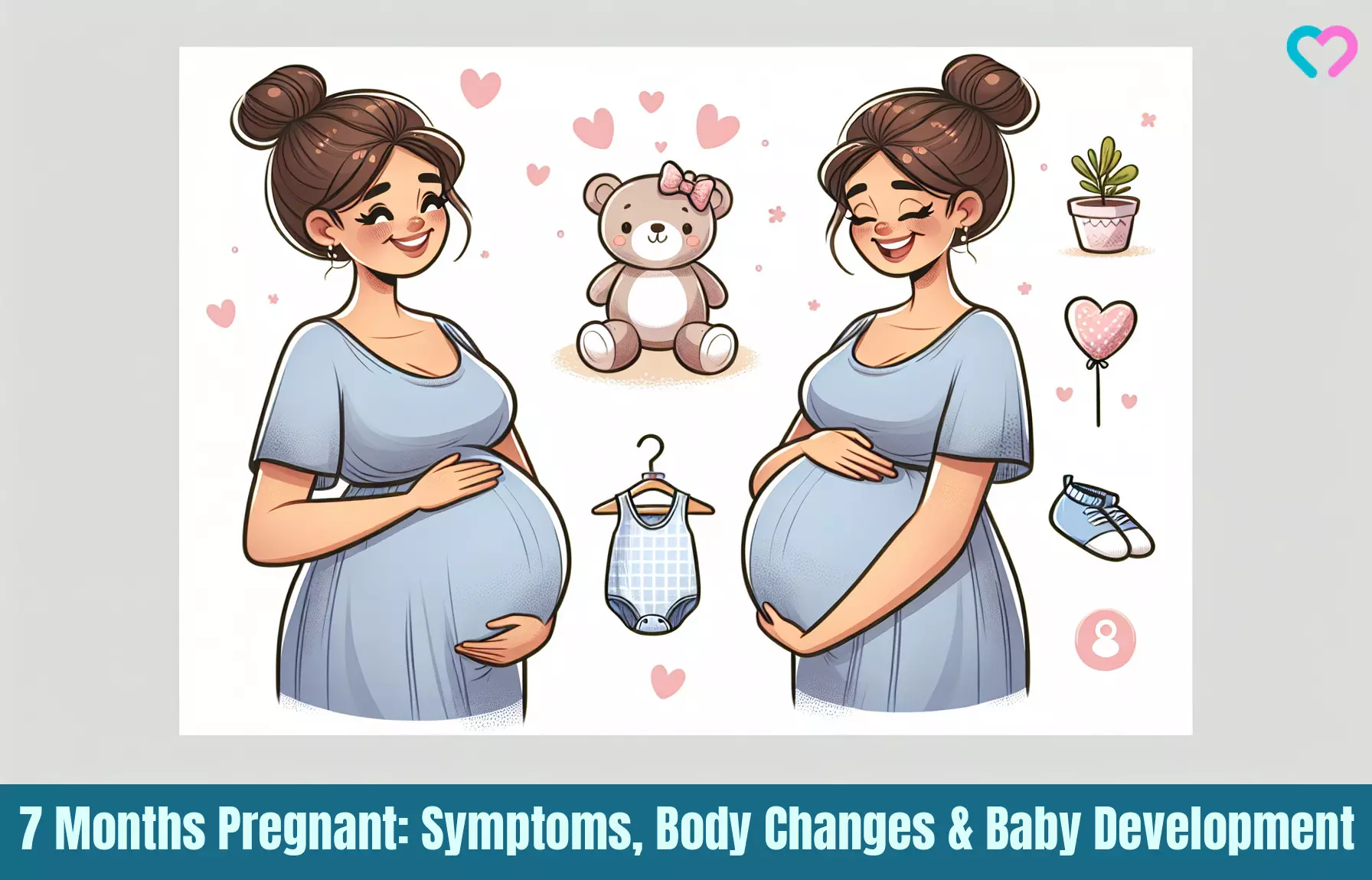
Image: Dall·E/MomJunction Design Team
References
1. Pregnancy- Signs, Symptoms and Health; Better Health Channel
2. Stages of pregnancy; Stanford Medicine Children’s Health
3. The Third Trimester; UCSB SexInfo (2017)
4. Pregnancy; California State University Long Beach (2019)
5. How Your Fetus Grows During Pregnancy; American College of Obstetricians and Gynecologists (2018)
6. Elizabeth Fenwick; The Complete Book of Mother and Babycare; page 23
7. Third Trimester Fetal Development; Sutter Health
8. Antenatal Care Module: 11. Assessing the Fetus; The Open University (2019)
9. Do’s and Don’ts During Pregnancy; Sutter Health (2008)
10. Caring for Yourself During Pregnancy and Beyond; UCSF Medical Center
11. Rh-Negative Blood Type and Pregnancy; American College of Nurse-Midwives
12. Ultrasound During Pregnancy; Beaumont Health
13. C. Almli, et al.; Human fetal and neonatal movement patterns: Gender differences and fetal-to-neonatal continuity; Semantic Scholar
14. WHEN IS IT SAFE TO DELIVER YOUR BABY?; University of Utah
15. Pregnancy: The seventh month; AboutKids Health
16. You and your baby at 37 weeks pregnant; NHS
17. Why Is 40 Weeks so Important?; NewYork State Department of Health
18. Pack your bag for labour; NHS
Community Experiences
Join the conversation and become a part of our nurturing community! Share your stories, experiences, and insights to connect with fellow parents.
Read full bio of Subhashis Samajder
- Dr. Matthew Casavant is the founding physician of South Lake OB/GYN & Advanced Surgery. He received his medical degree from Nova Southeastern University in South Florida and completed his residency as an Ob/Gyn at St. Vincent’s /Mercy Hospital in Toledo, OH. Dr. Casavant also holds a BS degree in Micro and Molecular Biology.
 Dr. Matthew Casavant is the founding physician of South Lake OB/GYN & Advanced Surgery. He received his medical degree from Nova Southeastern University in South Florida and completed his residency as an Ob/Gyn at St. Vincent’s /Mercy Hospital in Toledo, OH. Dr. Casavant also holds a BS degree in Micro and Molecular Biology.
Dr. Matthew Casavant is the founding physician of South Lake OB/GYN & Advanced Surgery. He received his medical degree from Nova Southeastern University in South Florida and completed his residency as an Ob/Gyn at St. Vincent’s /Mercy Hospital in Toledo, OH. Dr. Casavant also holds a BS degree in Micro and Molecular Biology.
Read full bio of Rebecca Malachi
Read full bio of Swati Patwal
Read full bio of Aneesha Amonz







